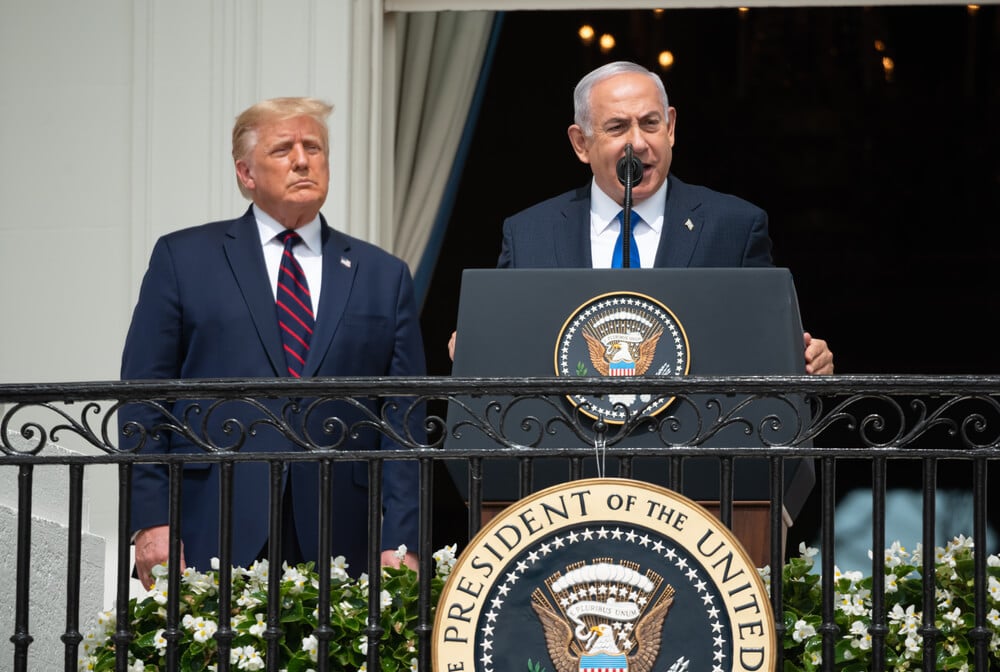US President Donald Trump's idea to move Palestinians out of Gaza and turn it into a "Riviera of the Middle East" has, as shocking as it was, already fulfilled its purpose to a large extent.
President Trump has thus raised a bar of political expectations well beyond what seemed feasible before he took office.
In many ways, the extreme idea of turning Gaza into Miami, without Palestinians in it, will be more or less corrected, but since President Trump has launched it, its outlines will hover over all future negotiations on a post-conflict Middle East.
Trump has escalated things once again, only to de-escalate them very quickly afterwards. As with the 25% tariffs on imports of goods from Mexico and Canada, which President Trump postponed for a month after talks with the leaders of the two neighbouring countries, de-escalation is already underway.
Moreover, it came very soon after Trump's loud announcement, which he made during a press conference with Israeli Prime Minister Benjamin Netanyahu.
Important reactions
White House press secretary Karoline Leavitt was quick to explain that the president has no intention of sending US troops to Gaza. Secretary of State Marco Rubio also allayed concerns that the expulsion of the Palestinians would be permanent, which could be inferred from Trump's first speech.
“In the interim, obviously people are going to have to live somewhere while you’re rebuilding it,” said Rubio.
Nonetheless, in the brief time between escalation and de-escalation, Trump and his team received very extensive material on international reactions to the idea, which was perhaps only put into play for this purpose.
Trump received the enthusiastic support of Israel's right wing
The American president received the enthusiastic support of Israel's right wing because the complete expulsion of the Palestinians from Gaza and its transformation into a Mediterranean resort is certainly something they themselves aspire to—perhaps even more than that.
One of them, the finance minister in Netanyahu's government, Bezalel Smotrich, said that he is working with the prime minister “to prepare an operational plan and ensure that this vision of President Trump is executed in reality.”
“We must kill the idea of a Palestinian state through annexation and imposition of sovereignty,” said Smotrich, an extremist settler and leader of the far-right Religious Zionist Party.
Pleasing Israel
Trump used Prime Minister Netanyahu's visit to the White House, the first visit by a foreign leader since taking office, not only as a gesture of his commitment to Israel but also to reaffirm it by presenting a radical concept for a post-conflict Gaza.
His plan won the hearts and souls of Israelis, not just those on the far right. It was an extreme solution that freed Israelis from the burden of organising the post-war regime in Gaza and accepting compromises.
Trump presented creative, original and interesting thinking - Benny Gantz
Trump's concept was also cautiously accepted by moderate leaders, such as centre-right Benny Gantz. “He (Trump) presented creative, original and interesting thinking, which must be examined alongside the realisation of the goals of the war,” said Mr Gantz, former army chief.
One of the important, if not the most important, factors that has made Trump's vision of Gaza very popular in Israel is the fact that it acts as a very solid guarantee that no more attacks will be carried out against Israel from Gaza, which was one of the main objectives of the military operation against Hamas.
However, this kind of guarantee is not achievable because it would mean the complete and permanent expulsion of Palestinians from Gaza beforehand.
The pendulum swings in the direction of the Arab partners
While he received full support in Israel, President Trump triggered an avalanche of criticism on the other side, among the Arab partners.
Amidst a series of harsh reactions from Egypt, Jordan, and the United Arab Emirates, the unusually strong response from Saudi Arabia holds significant importance for Trump's future actions: Saudi Arabia will “continue its relentless efforts to establish an independent Palestinian state with East Jerusalem as its capital and will not establish diplomatic relations with Israel without that.”
Trump might have primarily sought this reaction to explore the boundaries of his potential future actions in the Middle East.
 The historic agreement on the normalisation of relations between Saudi Arabia and Israel is Trump's ultimate goal in the Middle East
The historic agreement on the normalisation of relations between Saudi Arabia and Israel is Trump's ultimate goal in the Middle East
The historic agreement on the normalisation of relations between Saudi Arabia and Israel is certainly Trump's ultimate goal in the Middle East, and he will undoubtedly not do anything reckless in the next four years that could jeopardise this agreement.
Trump came very close to this line with the story about the expulsion of the Palestinians from Gaza. Riyadh has clearly confirmed this, and now it is time for the pendulum to swing in the direction of a rapprochement between the American stance and that of its Arab partners.
Saudi Arabia’s Crown Prince Mohammed bin Salman was the first foreign leader Donald Trump called after taking office. Trump's first visit to a foreign country during his previous term was also to Saudi Arabia.
With Trump's envoy to the Middle East, Steve Witkoff, visiting Middle Eastern capitals including Riyadh last week as part of his first tour of the region since taking office, the administration's next steps will surely be more proactive with its Arab partners.